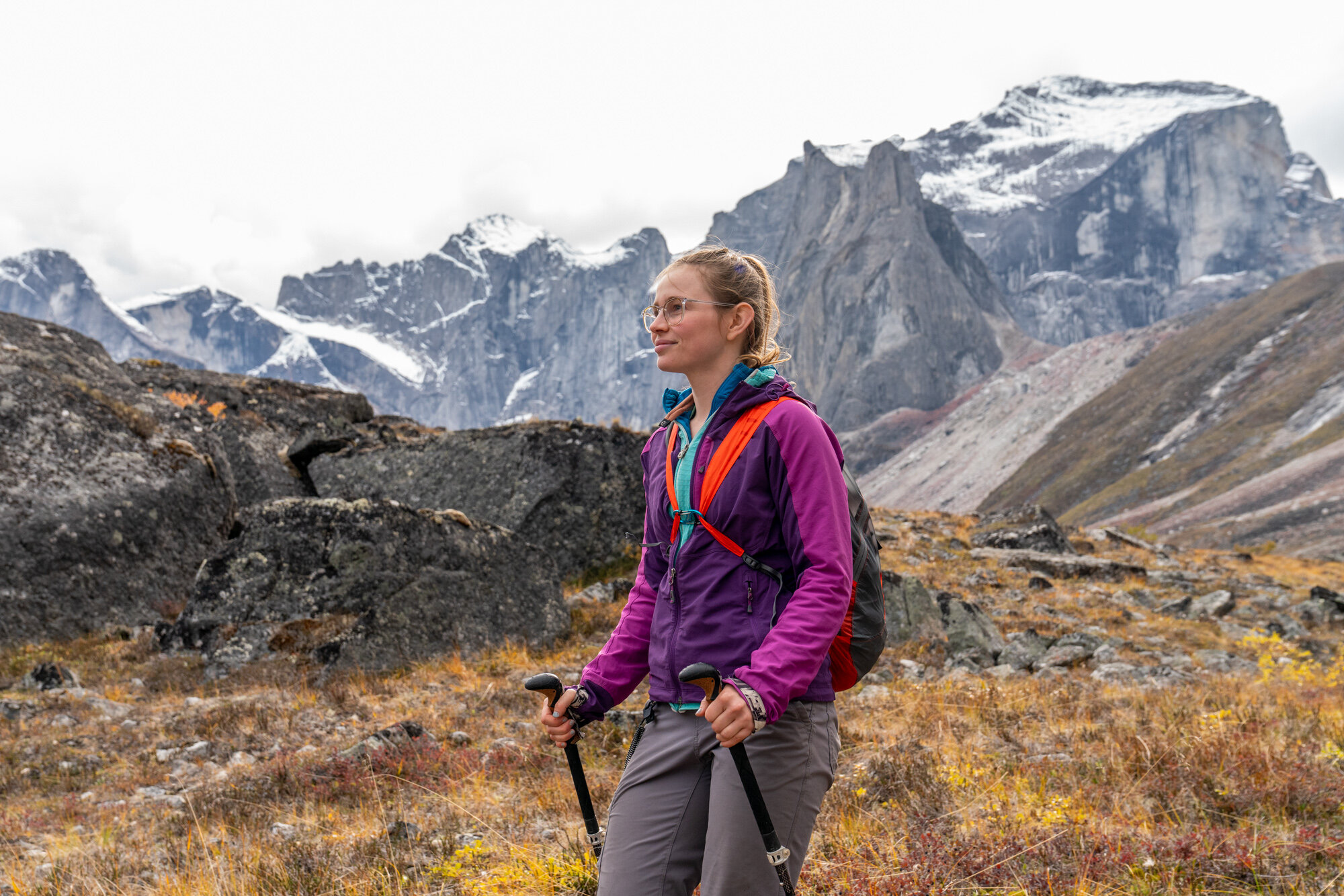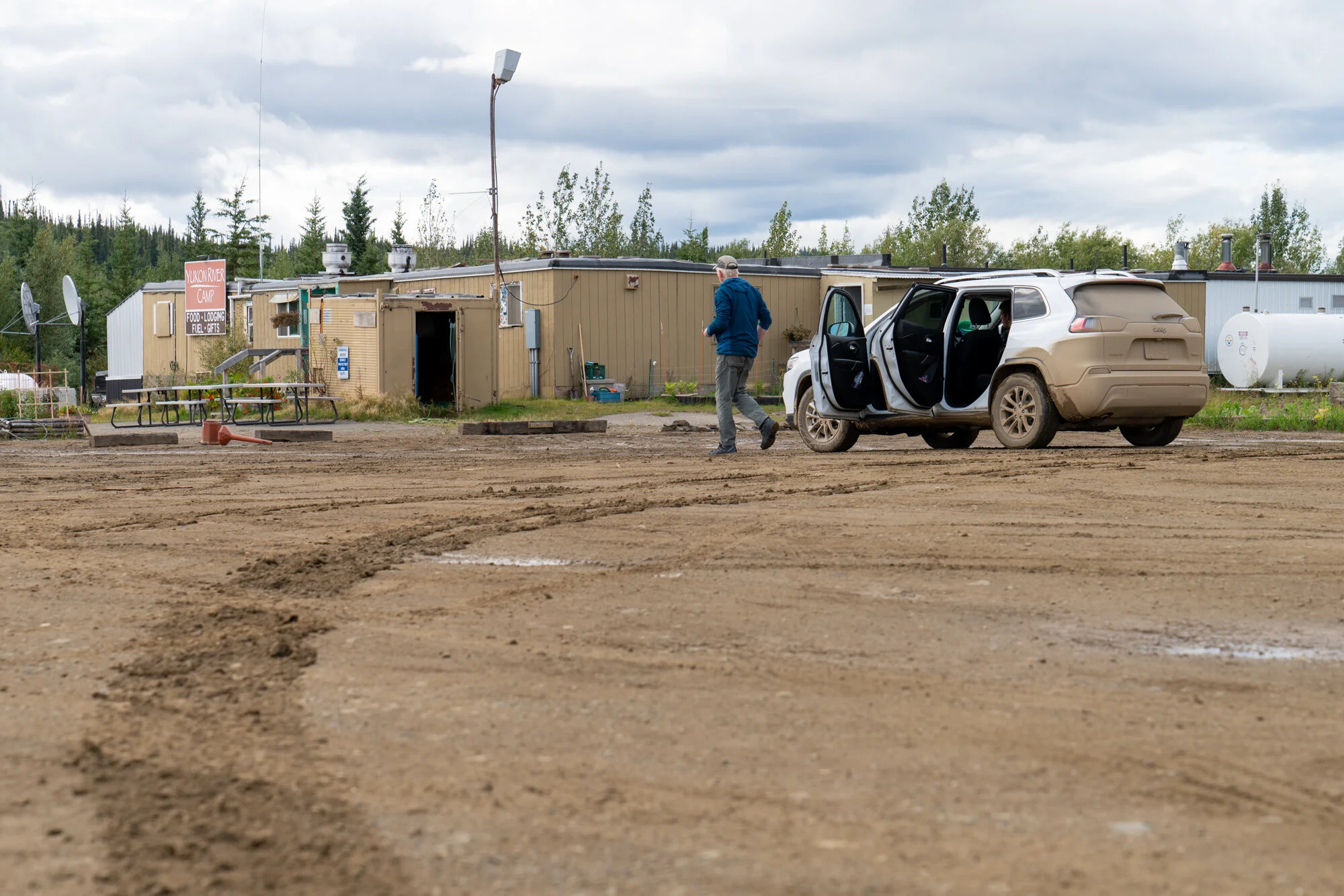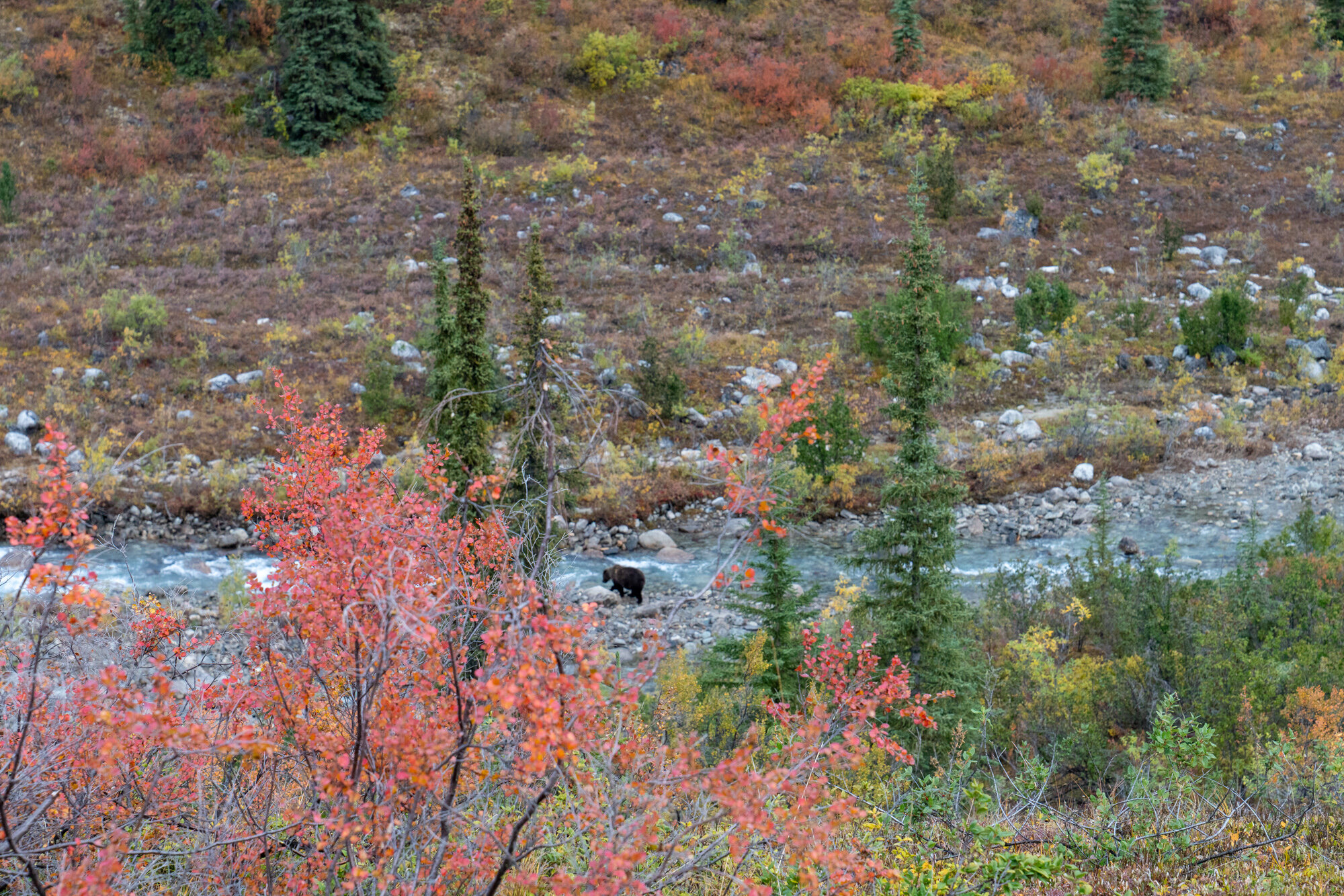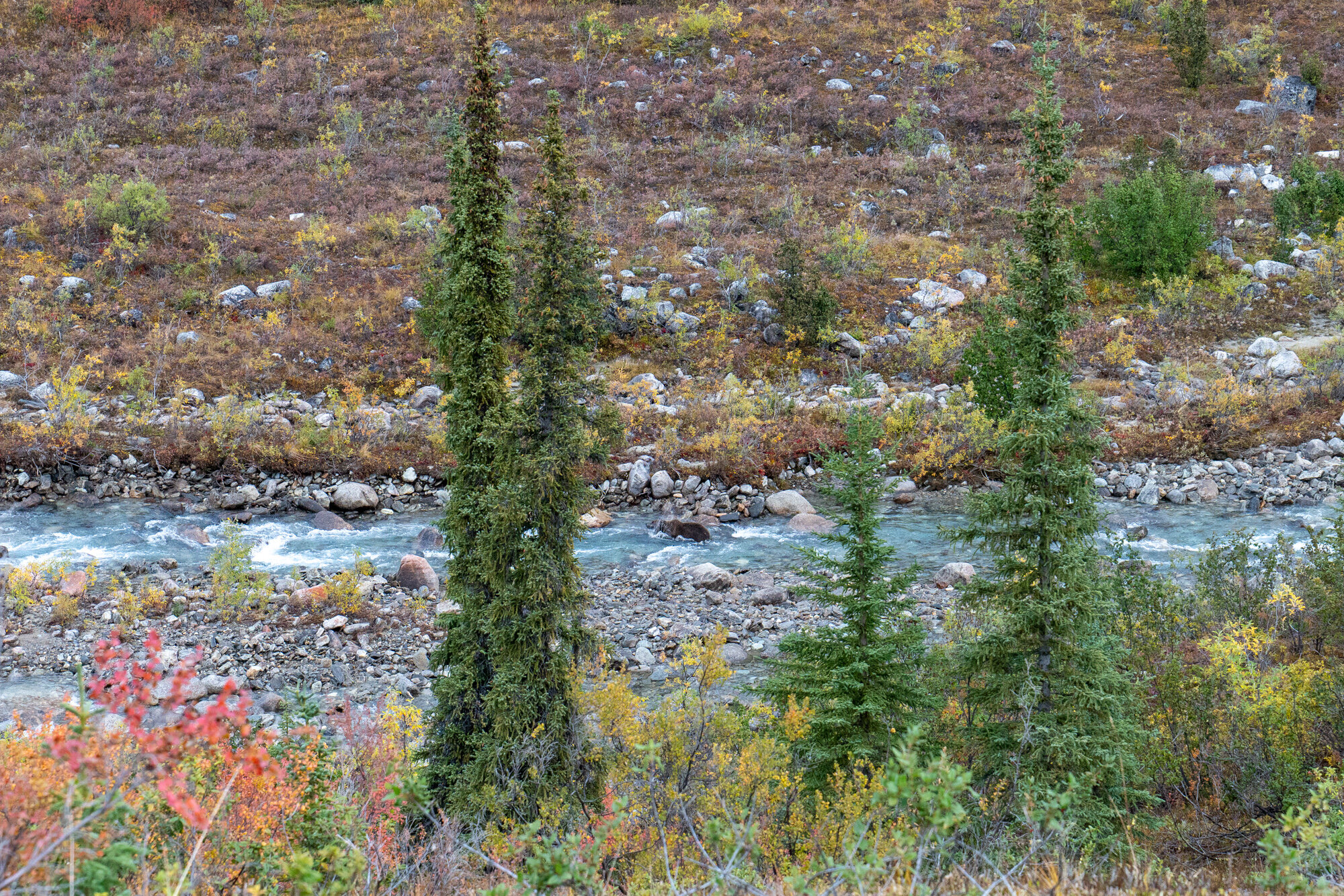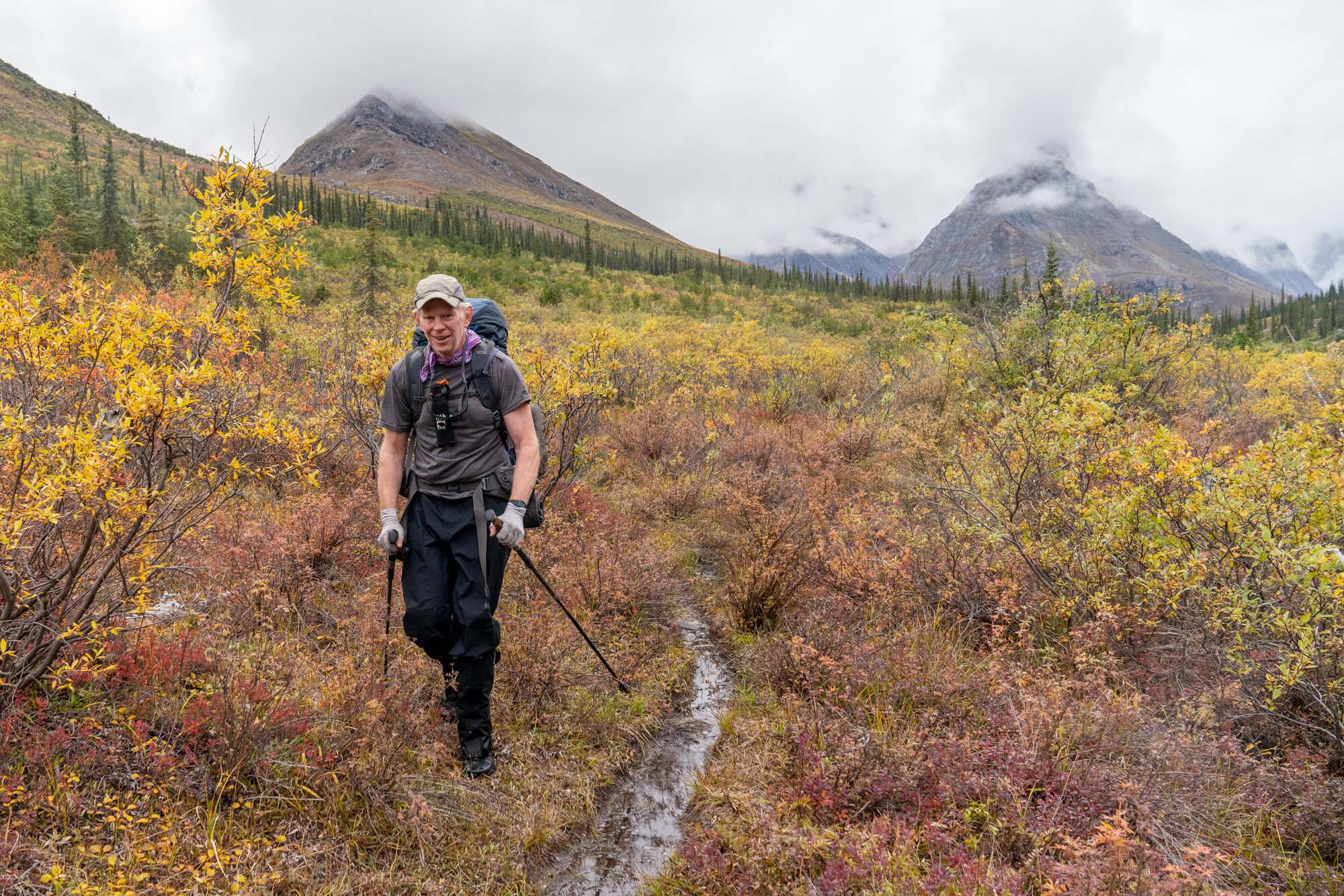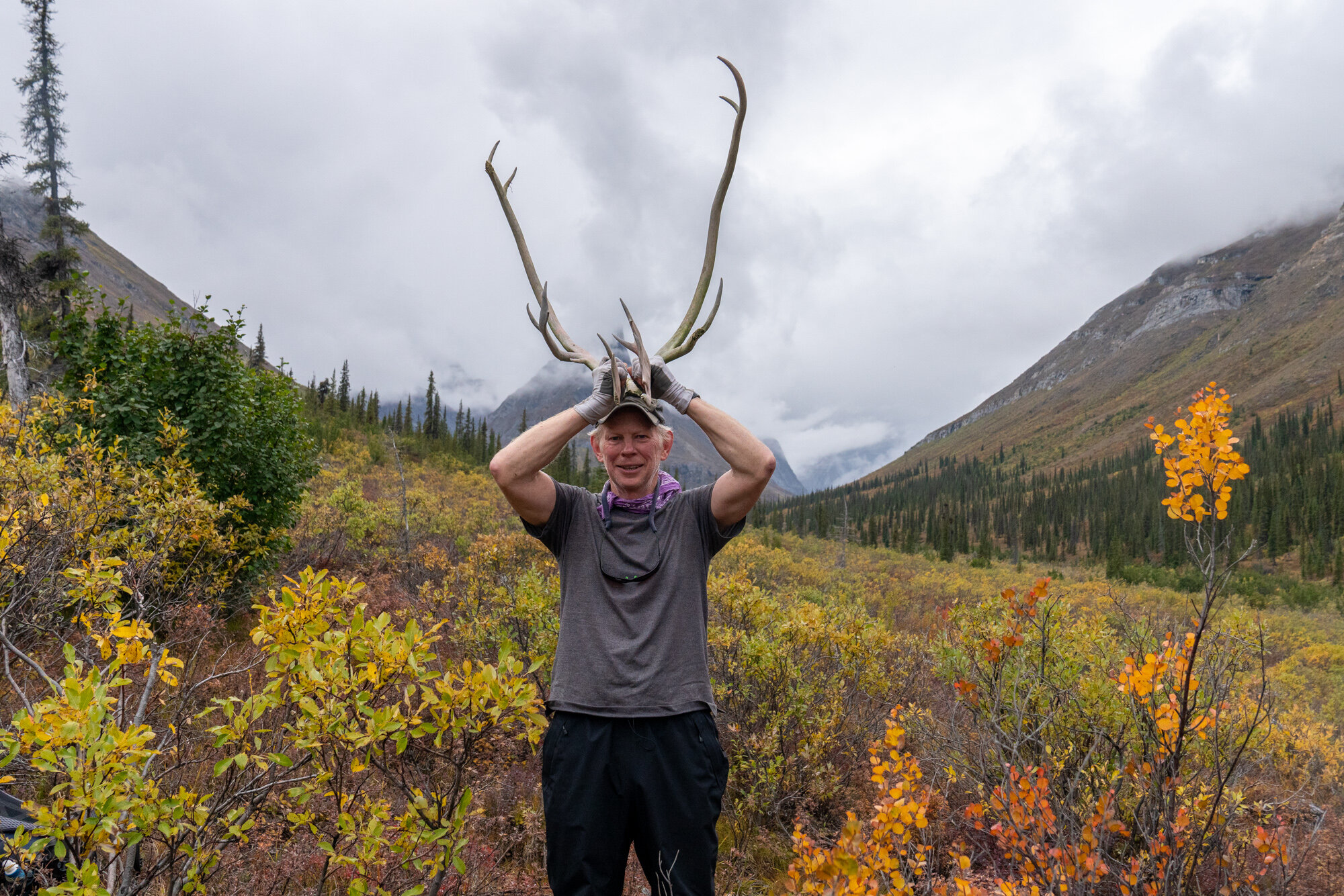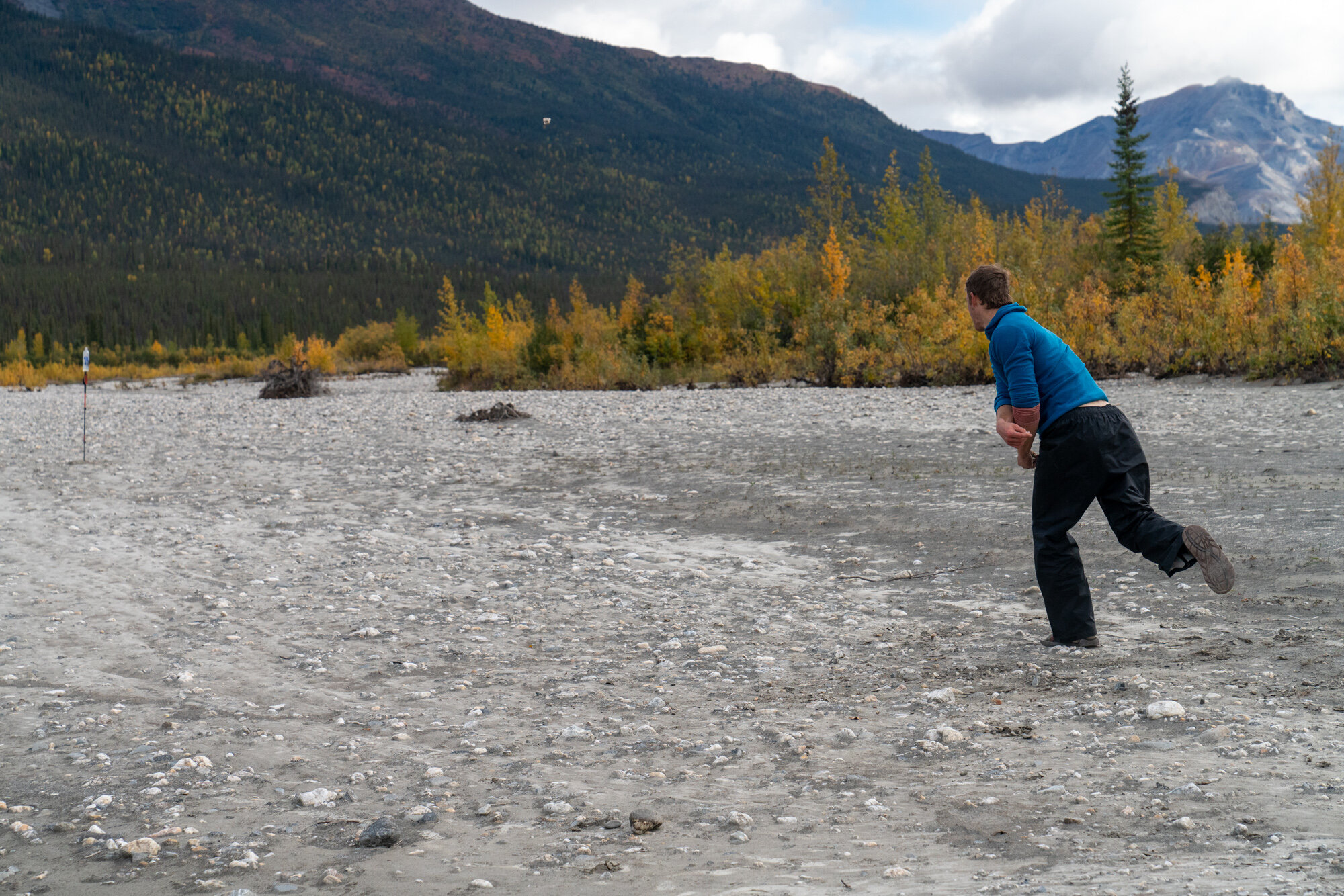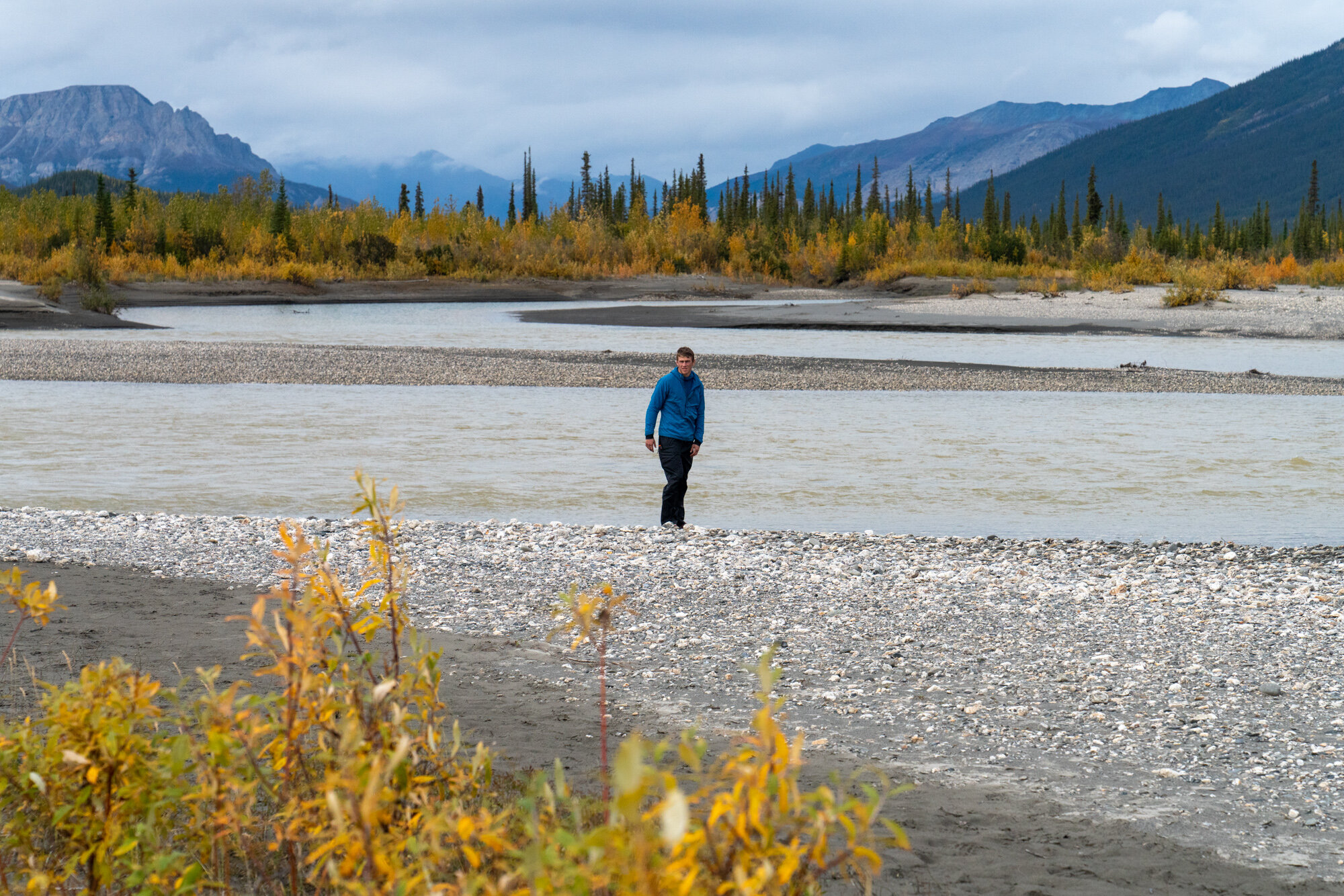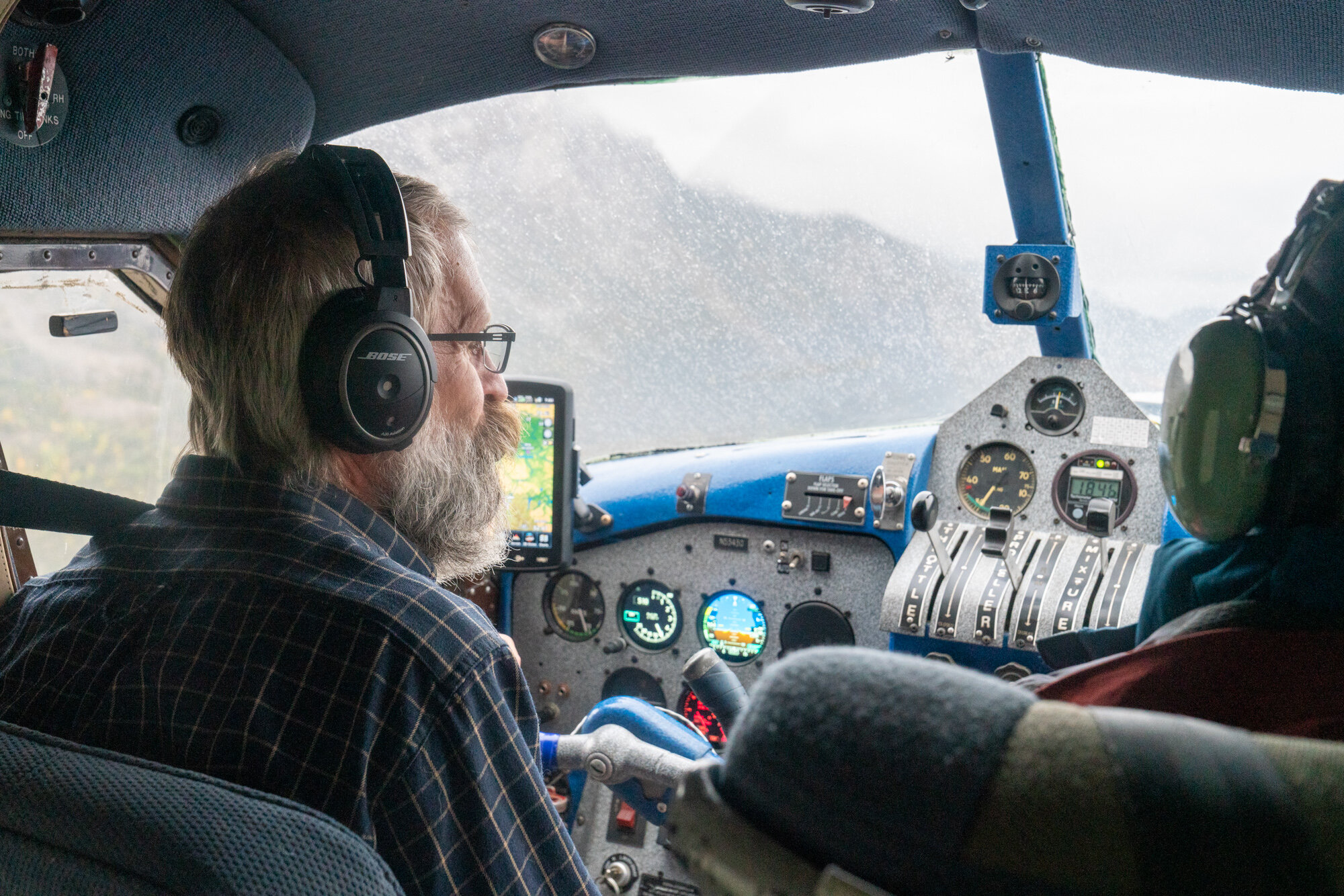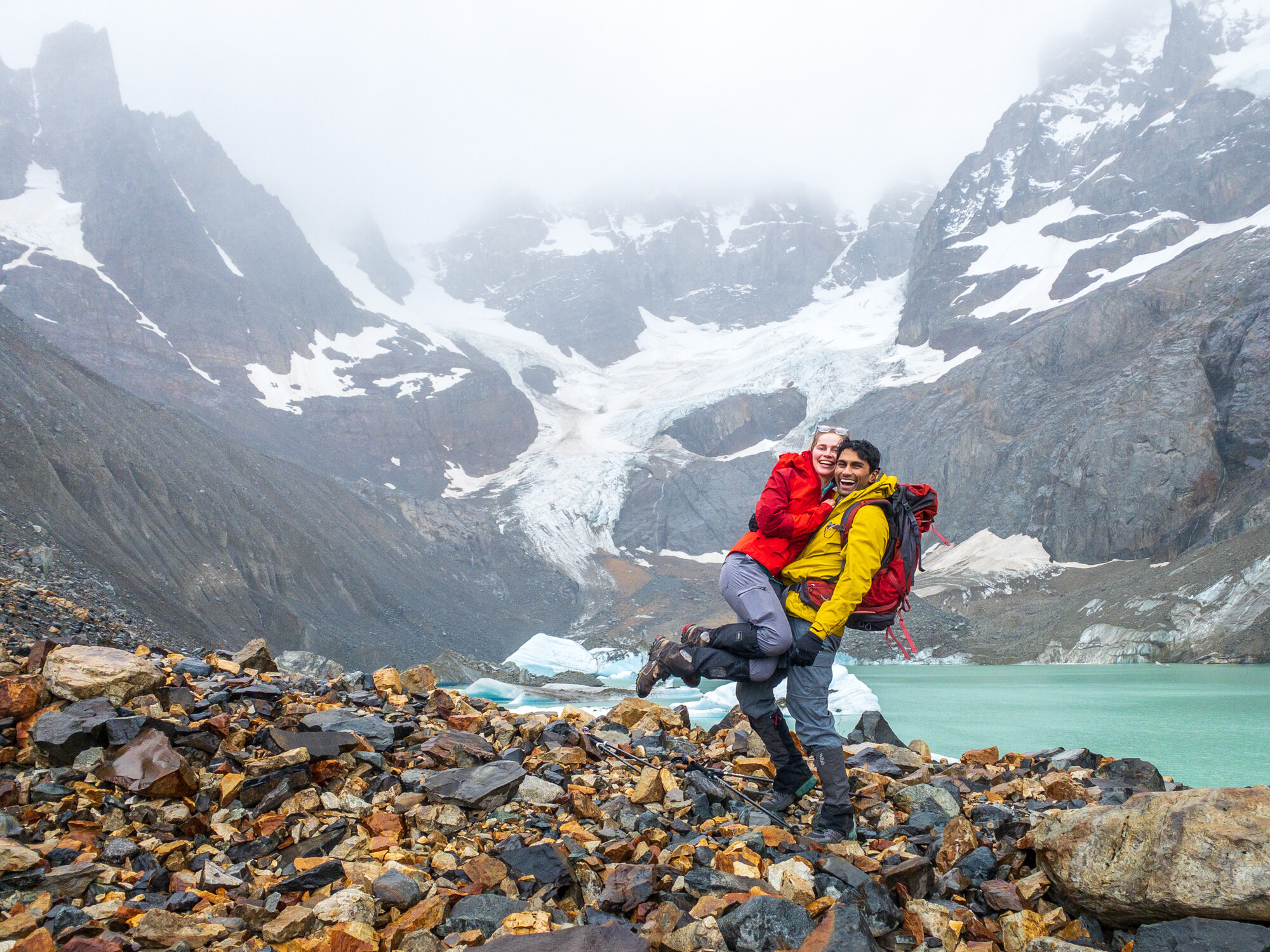BACKPACKING THE ARRIGETCH PEAKS
Eleven days of autumn in Gates of the Arctic National Park
If you’re planning a trip to the Arrigetch, feel free to use this write-up to support your own research! I’m reluctant to openly share specific details (e.g., gpx lines, ideal spots to camp, etc) beyond what I’ve posted here in order to spread out the impact of people moving through the valley. If you’d like to hire me to privately consult on your trip, pass along many hours of research, or even join you, reach out.
FLIGHT TO FAIRBANKS
Despite having planned for almost a year, I was surprised we were only days away from setting foot in Alaska. It was probably my focus on the logistics that had me forget we had to actually go somewhere; there was more to do than simply dream up ambitious lines on a topo. I’ll admit that small part of me wanted to stay in that headspace, endlessly daydreaming and optimizing the minutiae. For months it had been something to look forward to and excite co-workers with. Even though I’ve spent a decent amount of time playing in the mountains with consequences, there was nothing close to the level of self-sufficiency and uncertainty that comes with being in Gates of the Arctic. A friend, possibly questioning whether I knew what I was getting myself into, described it as black-belt level backpacking.
As we landed in Fairbanks, I peeked out of the window and could see the clouds were heavy, pressing low into the tarmac. I turned my phone off airplane mode, immediately refreshing the forecast I was looking at hours before. Within the valley we had our sights on there was a steady rain each day from now til the end of August. It even seemed like we’d get snow. I took a deep breath. Regardless of the weather, I made sure to pack a good attitude. After all, we did plan a trip to Alaska. Instead, I was actually anxious about whether we’d even get a flight in to Gates. All of us knew there was a chance we’d be dropped off in the wilderness only to be tent-bound for days sheltering from a relentless storm. Still, I found that scenario to be far more desirable than a week inside a hotel, waiting for the skies to clear before a plane could take off.
There wasn’t much to do in downtown Fairbanks besides stomaching disappointing Thai food and acquiring four cans of bear spray. Going into the Arrigetch Valley with me were Leah, her father (Bill), and brother (Aidan). I took a small mental comfort in a questionable fact that bear attacks for groups of four were unheard of. We spent most of that evening laying Bill and Aidan’s gear on the carpeted hotel room floor and beds, tossing aside extra warm layers and sleeves of Oreos that they could live without in order to slim down their packs. I had my weight down to a respectable 40 pounds, but there was nearly 10 pounds in camera gear and batteries to document it all.
DRIVING THE DALTON HIGHWAY
Our plan the following morning was to cover half of the Dalton Highway, used primarily by eighteen wheelers hauling supplies to Deadhorse/Prudhoe Bay on the north coast of the state. For steep sections, semi-trucks need to barrel downhill to build enough momentum to carry them over the tops of hills. If you saw one in your rearview mirror, it was best to pull over. The conditions on the narrow gravel road would be heavily dependent on recent weather patterns. The road was used all year, even when icy. Knowing that, I was relieved that our only worries in the summer would be tire-sucking potholes, large animals, and washboards at 50mph. We’d later see a photo of what used to be a car absolutely totaled by a sudden bull moose collision.
I wasn’t sure how long it would take for us to drive up to Coldfoot, the small town with a population of ten according to the last count. We’d spend a night there before meeting Dirk, who was one of the ten residents and our pilot. If we were lucky, he’d be dropping us off in the Arrigetch Valley the next day. Estimates varied dramatically for the 250-mile drive on the Dalton, from five hours to up to eight, reminding us all that the weather here carried heavy influence on what you could and couldn’t do unlike back home. After a last minute stop at REI to pick up a GPS watch (I left the custom charging cable for mine at home), we were on our way. The city of Fairbanks faded away within a minute as we followed a band of gravel running parallel to the famous pipeline, all tracing through a thick wilderness of stunted trees embedded in the permafrost. We lost service shortly after. For the next two weeks the only tether we’d have to anyone listening back home would be through our inReach devices.
Bill started out driving, and to my relief did all of the driving for the trip. He’d later tell us that the car was fishtailing on several turns. Besides the occasional pothole he’d slam into, I was zoned out in the back, stifling laughter to episodes of Curb Your Enthusiasm on my laptop. I’d occasionally peel my eyes away to look out onto the landscape, at one point spotting a solo bikepacker pedaling south. I thought about all of the random cyclists I met in Patagonia years ago, some starting on this very road and making their way down to the other end of the world.
To our delight and surprise, the clouds seemed to be breaking apart the further north we drove. The group mood in the car would rise with every ragged patch of of blue that we spotted. After a few hours of driving, we crossed the Yukon River, which felt like a milestone worth celebrating. The Yukon River Camp would be where we’d fill up on gas for almost $6 a gallon. I read that they served delicious and fresh, home-cooked food, but we were deflated by a familiar sign citing labor shortages for kitchen staff during Covid. We made another stop for a photo by the Arctic Circle sign, where two moth-sized mosquitos tried to enter my ears. I questioned my decision to leave bug spray at home, assuming it’d be cold enough this late in the season to skip it.
Before long we were finally in Coldfoot, on the eastern edge of the enormous Gates of the Arctic park boundary. Our first stop was the Arctic Interagency Visitor Center. There weren’t any permits necessary to enter America’s least visited national park, but we were keen to hear about recent conditions and to share our plans. We weren’t sharing our itinerary in the hopes of getting a rescue. Where we were going, we’d be told repeatedly, the best rescue would be not needing a rescue and the second best rescue would be self-rescue. This wasn’t dissimilar to the mindset I had from alpine climbing, so I wasn’t spooked by the mandate to be self-sufficient. The head ranger, Robert, was a soft-spoken man with the largest hands we’d ever seen. Our pilot, Dirk, told us that Bob would mostly keep to himself, but was unlike any of the other locals in terms of his expertise and savvy in the wilderness. Both of these likely contributed to legends about this giant of a man. Each morning he’d walk 20 miles along the highway to work, and you’d be able to spot him from far away by his unusual gait. Dirk sometimes would see him from the air in the middle of the tundra, casually walking a few hundred miles back home alone through the thick and spongy ground as if it was a paved sidewalk, which also got him the nickname of “Caribou Bob.”
We didn’t know any of this when we met Caribou Bob. He warned us about the resident grizzly that patrolled the area we planned to make our base camp. While the park itself was infrequently visited, the Arrigetch Valley was a popular destination for those who did venture far north. The Arrigetch Valley was in fact declared a national landmark years before the enclosing park was officially designated. The landscape was remarkable for its granite spires thrusting into the sky, attracting rock climbers, pack-rafters, and backpackers to explore the area. From the NPS:
…the Nunamuit Eskimos called the place Arrigetch, meaning “the fingers of the hand outstretched.” They told a story of a mighty hunter who taught them to survive in the harsh arctic landscape. He showed them the best animals to hunt and which plants to use. Before he left, he threw down his gloves and transformed them into the towering granite spires of the Arrigetch”
All this concentrated popularity eventually led to our resident grizzly losing his fear of humans. The week before, we were told, a woman separated from her group was crossing a stream and crossed paths with the bear, ending in a bluff charge. We also heard that a few groups returned to find their campsites rummaged through. Caribou Bob asked that we keep a clean camp, and I sensed some pleading in his request. I wondered if he wished he could be out there in the field, ensuring if people were actually respecting LNT principles. I thought about whether it was only a matter of time before the bear did attack a hiker and needed to be taken out. We said our goodbyes and headed off to dinner.
We crossed the only street in town and filled up several plates of food at the Coldfoot Camp buffet, part of a larger truck stop staffed by a happy, young crew. The food was surprisngly great, and we didn’t trick ourselves knowing it’d be our last proper meal for days. We crossed the street again and went looking for Dirk by the town’s airstrip. Just as we pulled in, we could see that his wife Danielle was flying out to pick up several clients who were “overdue by a few days” because of weather. Like most businesses dependent on tourism, Covid lockdowns last year were tough for the two of them, but this year was the first time they had to turn folks away. They could have grown Coyote Air by hiring more pilots to keep up with pent-up demand, but both Dirk and Danielle preferred keeping a lid on the popularity of Coldfoot and the Gates of the Arctic. I felt lucky that we even managed to get on their calendar months ago. Dirk’s only availability forced us into a ten-day trip, exactly what I was hoping for (the rest of our group figured seven days was their upper limit).
We spent that night a few miles further up the road in Wiseman, where we filled every exposed square foot of a cabin with gear before a final packing. Aidan counted his sheets of toilet paper (later wishing he brought more), Leah wrestled with the question of whether to use an Ursak bear bag or a hard-sided bear canister, and Bill went for a walk to take enjoy the long hours of daylight. Dirk asked that we be at the airstrip at 9am, so I was cautiously optimistic about tomorrow. I barely slept that night. It never truly got dark even with the curtains drawn. My mind was racing.
FLIGHT DAY
I had put the odds of flying out the next morning to a coin flip given that the mountain ranges we had seen yesterday were hidden in clouds. Over breakfast, we got the message from Dirk to hurry on over to the airstrip as soon as possible. There was an opening in the sky and he wanted to take advantage of it while it lasted.
It was still raining lightly when we met up with Dirk. We hurried through the paperwork while Dirk piled our packs into the cargo area of an orange 1953 de Havilland Beaver that he called Pumpkin. Before long we lifted off. I couldn’t believe our luck. We just missed the streak of weather that had grounded flights for days. There were still clouds to negotiate, so Dirk was cruising fairly low to the ground. Now that we were on our way, Dirk was more than eager to talk, sharing stories about how he met his wife (while on an assignment in Peru he got a message that a cute girl was visiting town, so he hopped on the next flight home), his horrible experiences with big budget film crews that hired him, and the amazing things he’s seen from the cockpit. He told me about the time he climbed with Conrad Anker and Alex Lowe around Talkeetna, not realizing who they were or what climbing was about. For Dirk, flying was a family tradition going as far back as his grandfather, Elmo, who would deliver mail when the roads were snowed in by chucking packages out of the window as he flew over North Dakota farms.
While Dirk spilled one story after another, I started to sense I made a mistake by drinking a half liter of water before boarding. I remembered the flight would be about an hour, so I began to count down. Every minute it became progressively harder to hold a conversation with Dirk’s voice crackling through my headset. After biting my lip, bouncing my knees, and doing breathing exercises to relax, I felt nauseous from the pressure to hold it all in. I peered over at the terrain below. None of it looked suitable for an emergency landing, and this would hardly qualify for an emergency despite my writhing. I knew we were only five minutes away but I had done my best; I was at a breaking point. I apologized to Dirk and said I had to go now. He didn’t seem to care; I wondered if he even heard me. For the past few minutes I had been eyeing a Ziploc bag in Aidan’s hand, playing out the scenario in my head and hoping I didn’t have to follow through.
I’ll never look at a Ziploc the same way again.
An embarrassingly short few minutes later, our plane smoothly touched down on a gravel bar that braided the Alatna river. Dirk mentioned there’d be four climbers waiting for him to pick them up. Sure enough, there were four guys curiously walking over to us. They’d been in the valley for 10 days, but had the bad luck of climbing just one day because of poor conditions. For them, it was a backpacking trip with over 80lb packs each, crammed with climbing gear that went mostly unused. They shared with us their bear sighting across a creek, describing him as absolutely majestic.
As with the start of any expedition, I felt light even though this was the heaviest my pack would be; my legs were fresh and ready to suffer. Bill cursed at how heavy his pack felt and I reminded him he’d shave off two pounds in food each day. Before we could plunge ourselves into the thick brush, we had a handful of stream crossings to welcome us. Dirk and his wife had both laughed at the Bill’s question about how best to keep his feet dry. They both said it was impossible and we might as well get wet immediately. Danielle even offered to hose down his boots before he got on the flight. The most common injury was from hikers who rock hopped across streams in a futile attempt to stay dry, ultimately slipping and landing painfully. I knew all this, but I was curious whether I could defy the odds and keep my toes from getting soaked.
We carefully plotted our way through the dense gates of alders, keeping enough distance from each other to avoid the painful whip of a swinging branch. I caught one on the lip when I got a bit too close. This was my first time walking on and around tussocks, the large clumps of densely bundled grass dotting the landscape. They were unusual in that they’d slowly tip over if you put your weight on them. If you weren’t careful, it could mean your ankle might roll with it. I actually found them fun to stand on. While there aren’t any official trails in Gates of the Arctic, the Arrigetch Valley had a faint game trail that over the years had turned into a well stomped-out social trail. From where we were dropped off, it wasn’t clear how to find it. We spent hours following faint lines in the dirt, most of them disappearing into thick brush or stream crossings.
Once we found the trail, we moved at almost triple the speed of bushwhacking. That didn’t mean it was easy going. Fortunately, each step brought us deeper into the valley, and more of the peaks revealed themselves as the clouds peeled away. Even though our options were fairly limited in the heavily sloped brush, we didn’t feel a rush to make camp. We’d have daylight til almost 11pm; I didn’t even bother bringing a headlamp. However, this far north, the seasons transition quickly and we’d lose two full hours of daylight within the short span of our trip.
After a casual seven hours of hiking since we last saw Dirk, we stopped for the night. The sprit of Caribou Bob was with us, as was the looming fear of a bear encounter; our kitchen area was set up well over 100 yards from our tents. After dining on a bowl of Fritos and refried beans that had the charred flavor of being burned, it felt too early to call it a night. It still looked like a beautiful afternoon and my legs could’ve gone on for several more miles, but I slipped on my sleeping mask and tried not to think too much about it.
BASE CAMP
The first morning of any backpacking trip is special, as it sets the pace for the following days. I hadn’t camped with the Breen family before, but I would quickly learn they were not morning people. I was awake first. I slipped out of my sleeping bag and into the crisp dawn air, a thin coating of frost cracking under my down slippers. This being the first morning also meant I’d have to get used to the idea of digging a hole as a daily ritual, and I was relieved I didn’t have to poop yet. I was thoroughly cozy wearing all of my layers, not yet ready to expose my bare ass to the Arctic. I planned to wait til at least the sun peeked over the ridge. I had on two puffy jackets, the extra one packed as an afterthought after (correctly) assuming there was no way I could ever regret being too warm.
We made our breakfast together, although it was probably more accurate to call it brunch. I enjoyed that first meal of the day since it was when we’d all share our thoughts on the day’s plan and I’d announce the weather forecast that Leah’s mother had messaged me on my inReach. It was another beautiful day in Gates of the Arctic. We learned not to take the forecast too seriously when it called for a slight chance of rain. By the time we had the tents disassembled and crammed into our packs, it was well past noon. Even though I was already starting on lunch snacks the moment we set off, it never felt too late given how long the sun would be out. By now, the trail was easy enough to follow and I could’ve mistaken much of it for a smooth singletrack at a bike park.
The valley continued to open up the deeper we pushed into it, as did the clouds. We had our clear first sight of Xanadu, a massive granite formation characterized by a sheer wall that looked like it was cleaved off, reminiscent of Half Dome in Yosemite. We didn’t have far to go, so we stopped whenever we had even the slightest opening in the forest for a view. We began to pass by bushes heavy with ripe berries. The rangers told us that it was the best tasting season they’ve had in years, and that the bears would be getting their fill before winter would set in. A little bit off trail we found our first caribou antler, one that very likely had been shed a long time ago. We’d later come across another that was fresher, patterned with pink splotches of dried blood, and gnawed on at the edges like it was a chew toy.
The sound of the creek grew louder as our trail angled closer to the water’s edge. Pretty soon we were right on the banks. The formation called Elephant’s Tooth, shaped like a wizard’s hat, that we had been aiming for loomed above our heads. We decided this spot was perfect for the upcoming objectives and began searching for a flat area to lay down for the next few nights. We made dinner by the creek under a bright evening sun. We spread out in a circle and slightly angling ourselves to face different directions to get the best sight on this resident bear lurking in this valley. Fortunately for us, the bear had dinner plans elsewhere else that night.
AQUARIUS VALLEY
It was another crisp and dry morning, at least in our small corner of Alaska. While there weren’t any blue skies to celebrate under, any defiance of the daily rain forecasted was a gift. Hikers we had seen leaving the valley yesterday had told us the bear was loitering around Aquarius Valley, exactly where we had intentions of exploring today. It was the hike we were most keen on doing and none of us wanted to play it safe by waiting another day. There was no guarantee this weather window would hold. There was also no telling where this bear was at any point in the day so it didn’t feel like our decision was laden with unnecessary risk. Still, for our first breakfast out of base camp we were a bit more vigilant than usual heading down to our kitchen area.
Spill Bill
I settled into a routine of eating the same breakfast every morning. It was one I never tired of and would always look forward to: a hot bowl of oatmeal dusted with chocolate recovery powder and thickened with honey peanut butter. It wasn’t too dissimilar to what I would eat at home before a big mileage day.
Bill had a bit more variety in his pantry. Today he was trying out some freeze-dried eggs. What he hadn’t tried though was cooking it in the flimsy, foldable skillet that he packed. While his runny eggs heated over a flame, his handle collapsed not once, but three times, coating his fuel canister and a small patch of tundra with a fresh layer of eggy goop. I managed to capture the second spill on video, struggling to keep the camera straight while we laughed our heads off.
He did his best to scoop up the mess, but I figured if there ever was a way to maximize our chances of seeing a bear near camp, this had to be it.
We were fairly quiet changing into our hiking gear. Although we were committed to the Aquarius Valley, I’m certain I wasn’t the only one feeling we might be walking into the path of a grizzly by going there. On the trail, each of us said variations of “hey bear!” more in a half hour than we all did the previous two days combined. Within minutes of setting off, we encountered fresh bear scat placed right on the path. After poking around with our poles, we kept pushing onward, scanning for any signs of movement on the bushes. Leah started singing happy birthday to mix it up, and I could hear a tremble of nervousness in her voice.
Boulder field
Without a bear in sight, we moved quickly up the slope to what was the mouth of the valley, marked by a broad and steep boulder field that we’d have to traverse. Unlike other boulder fields I’ve seen in the wilderness, where certain rocks have “settled” more from the movement of people, many of these seemed like they could tip and topple at any moment.
We had to pick our way though without pulling or pushing on any lichen-encrusted boulders more than necessary. Dislodging one could send a cascade of boulders raining down.
I felt my body relax when we finally made it to the first lake. I could turn my brain off now that we were past the precariously stacked boulders, at least for now. We could see quite a ways ahead, and saw neither bear nor hiker. We had the quiet of the valley all to ourselves. The sweeping valley walls shielded us from any wind, so the water’s surface looked more like a blue mirror reflecting the heavily textured cliffs. We sat by the water’s edge and tore into a few snacks. Although we had a late start, we figured there was enough of a weather window to keep pushing further to the tarns up ahead.
We skirted the edge of the lake, which was framed on all sides by even more boulder delicately balanced at a steep angle. Each step again felt like pushing my luck, and I wasn’t too thrilled with the idea of returning back the same way.
After we made it to the next tarn, Bill and Aidan took a long and deep nap. We agreed to leave in 20 minutes after noticing it was getting late in the afternoon. While none of us were bold enough to assume an understanding of the weather patterns yet, we all had a feeling that rain would arrive soon and didn’t want to be on the wrong side of the boulder traverse when it did.
There was no way I was going to sit around for 20 minutes and nap though; I could sleep at home instead. I didn’t know when I’d ever be back in this valley, so I asked Leah if she wanted to run up ahead with me. She didn’t take much convincing. We quickly rounded a bend in the valley and opened up to what looked to my eyes like a secret cluster of high peaks touching the clouds. They had been out of sight til now, and the air was even quieter and more still this far into the valley. I almost felt like we should whisper as if we had stumbled into a library. Bill regretted that nap when we came back and told him.
The temperature dropped and the wind picked up just as we began to retrace our steps. It wasn’t until the boulder field traverse that the rain drops began to fall. Lichen can become incredibly slippery when wet; I was most nervous about a trip-ending accident happening here. Fortunately, the rain was light enough. As long as we moved swiftly and mindfully, the rocks wouldn’t be saturated by the time we were through.
We returned to camp with enough time to make dinner, still decked out in waterproof gear from head to toe sitting on a gravel bar. Even while getting soaked in the storm, there was no doubt in my mind that we were incredibly lucky to be sharing a meal together in such a spectacular place.
DEEPER INTO THE VALLEY
I woke up early again. Today it was cold enough for me to prefer keeping my sleeping bag fully zipped for another hour while I lay awake. The Breens were particularly tired, I could tell. I expected a late brunch once everyone was finally peeled out of their warm cocoons.
Leah was the first to notice. “There’s a bear by the creek!”
Sure enough, there was indeed a grizzly ambling around the gravel bar. It wasn’t too long ago we were having dinner there under the rain. Bill and Aidan soon rushed to join us on our perch.
The bear was maybe 300 feet or so away, fortunately below us. We all stood absolutely still and whispered in amazement. Leah reminded us all that if not for sleeping in again, we’d be having breakfast down there right now. Bill let us all have a turn at his binoculars, which were sharply focused enough to reveal the golden brown fur dappling the bear’s rounded shoulders. The bear crossed the creek, first bathing in it and shaking himself off like a dog before re-emerging on the other bank. We all let out a collective sign of relief that he seemed to be heading away. For a few moments, we were both amused and humbled watching him casually plow through and flatten thick alders, when it would’ve been easier to step around them instead. The bear crossed the creek again back to our side. It was enough to shatter our false sense of security; obviously the creek wasn’t any more an obstacle to the bear than those alders were. The bear was heading away from us, and Leah and Aidan both went back to readying themselves for breakfast.
Before they could get started, the bear paused. He raised his nose straight into the air several times. He must have traced our scent, and a few seconds later gave us a look, making eye contact with Bill through his binoculars. He did an about face and began heading uphill.
Patiently waiting
Bill and I both alerted them about the bear’s new direction of choice and told them to get ready. Leah grabbed both of her bear sprays, including one found on the trail. The Breens form a flank and kept a watchful eye on the brush to look for signs of movement.
We must have waited there for a half hour, but it only felt like minutes from the intensity of the moment. Bill ultimately made the call for us to get on with our day. We went back to our usual kitchen by the gravel bar. Not long after I finished my oatmeal did I spot the bear again, far in the distance traversing a slope and making his way to the valley we had explored the day before.
Right on trail
Our goal for today was to explore deeper into the Arrigetch. Most of it was out of sight as the valley took a sharp turn from where we camped. From afar we had seen glimpses of the high peaks that made the Arrigetch famous: Xanadu’s sheer granite face, the twin horns on Caliban, the glaciated massif of Wichmann tower, and the beautifully twisted pinnacle of Ariel.
We were on the trail for only a few minutes before we came across extremely fresh bear scat, only a few hundred yards from where we had last seen him. There was no doubt in our minds that the bear was using the trail to move around quickly, just as we were.
Compared to yesterday’s hike into Aquarius Valley, we had a more leisurely hike deeper into the Arrigetch. I discovered over breakfast that my cooking pot made a loud clang when rapped with my spork. I basically had a portable gong, and I was using it to alert the bear of our presence. The rest of the group seemed to like this idea, but I wasn’t too happy to be the one the the job of being the loud noisemaker.
With every step, the valley continued to unravel itself and before long the great peaks of the Arrigetch were within view. We had no set agenda for how far we would go, especially given how late in the day it was already.
When I first dreamed up of this itinerary, I planned for us to ascend up the backside of Ariel, the lone peak of granite buttressed by sharp ridges in three directions. It looked impossible but a steep third class scramble would have us nearly at eye level with the face of Xanadu. It would be significantly more mileage and elevation gain, but it would be worth it. I’d have to save it for another visit. Even if we had the hours to make an attempt, it was far too icy near the top to be reasonable with our gear.
It wouldn’t be long before we had to turn around, so I picked up the pace and stopped where we’d get a panoramic view of the Arrigetch peaks in all their glory. We found a place to sit on the terminal moraine of the glacier and quietly soaked it all in. Bill commented that this was the best hike he’s ever done in his life and that he’s never seen mountains like this before. I’m sure that not seeing another soul the entire day helped.
MOVING CAMP
Autumn had fallen in the Arctic. Dirk would later tell us that we perfectly caught peak foliage, adding that it’d be a short window for seeing color given an early summer freeze. Coming this late in the season also had the advantage of avoiding the worst of the mosquitos. I had a few bites on me, but I never bothered to put on or even bring repellant. The only mosquitos floating around when the evening temps hovered above freezing seemed to be the toughest of the lot, but were still sluggish and unusually easy to brush off.
Arctic fog
The clouds hung low in the valley when we crawled out of our tents that morning. A light rain coated the outside the walls. We didn’t linger for too long. It was time to get a move on.
There was a decent amount of mileage ahead of us today and we’d be relocating camp, which meant carrying a full load on our backs again as we moved through the tundra.
Our initial plan had been to stay another day at this base camp, but we were were confident in tomorrow’s forecast calling for snow. Rather than have a rest day here, we opted to make a push today and hunker down somewhere new to our eyes. The first half of the hiking went by quickly as we retraced our steps, heading out of the valley. Occasionally we’d turn to glance at the faint silhouettes of the peaks we had become acquainted with yesterday, catching only fleeting glimpses.
Easier hiking stopped abruptly when we had to make a turn off the trail. I knew the general direction we had to head in, but wasn’t sure where to find the best turnoff. We’d be heading into less popular terrain, which meant more bushwhacking. For the next few hours we moved slowly up steep brush, pushing up against a thick forest floor that tugged at our ankles. This was the first and only time on the trip where I felt like I was exhausting myself. We took frequent breaks, but none of us said much beyond noting the wide views we were starting to get of the Alatna River valley. Mostly we chose to catch our breath. Whenever I checked my watch, I couldn’t believe how little distance we had covered since the last break, so I stopped announcing progress altogether.
We finally made it to higher ground where we could move a bit faster. Almost immediately the wind began howling and it seemed clear we were about to enter a world of misery. A storm was closing in on us but none of us were certain when. From our vantage point, we had a rough sense of how much further we had to go, and it was nearly double what we had already done. There was no way we’d make it at this pace, not before the storm slammed into us. We decided to look for the next best flat area to call home for the next two days.
We descended from our high point after spotting water and in the hopes of reducing our exposure to wind. After one final push through a thicket of alders that violently flogged every part of my body for several minutes, we emerged to an ideal place to drop our packs and quickly set up camp.
Almost immediately after we cooked dinner and tucked into our sleeping bags, the rain drops began to pelt our tent walls. We again said very little that evening out of exhaustion and a desire to get inside before being soaked. There also was no plan for tomorrow besides enjoying a rest day. It was hard to keep a flame on my stove for long enough to boil water because of the wind. While eating, I realized that I lost one of my gloves; I was more bummed out about leaving trash in the wilderness than about not having it. Leah was the only one who felt confident enough to could retrace our steps through the alders, but there was no convincing her to use the remaining daylight to go searching. I hoped she wouldn’t forget it all overnight.
TENT-BOUND
What the storm lacked in intensity, it made up for in duration. Since the moment we slipped into our bags, the rain only let up for a few brief minutes that we’d use to relieve ourselves if we were lucky enough to be awake. Leah and I spent most of the day napping or reading aloud from my Kindle. All that napping was probably worse for my body; I probably didn’t deserve all that idle time. In hindsight, I should have wandered around the area for hours like Bill had.
After a lot of coaxing, I finally convinced Leah to show me where we exited the thicket of alders yesterday evening. Within a minute I found my glove, a spot of bright blue floating in a sea of bright yellow leaves.
SNOW DAY
The next morning felt like we were in a completely new place. I woke up to see an inch of snow covering everything around us and shook Leah to wake up. I had already forgotten that we were still in an August summer, but today I found it hard to believe.
Much of the snow melted off fairly quickly, not long after we finished breakfast. Dirk later told us that it hadn’t even been the first snow of the season.
Much of our conversation that morning was around the folks back home who were messaging with us. When I turned on my inReach for the forecast, I saw a string of messages about whether they should call a rescue because they hadn’t heard from us at all yesterday. I tried to quickly type out that we were far from needing a rescue and all we did was nap and read books.
I would later regret my regular communication with the outside world, even for weather. While it was fun to feel connected by sharing small updates, even in the Alaskan wilderness I never felt like I was truly out there.
The snow became patchier as the sun broke through the clouds. We ascended up a slope, first studying it closely to see where we could walk between the patches of alders. After some steep hiking to start our day, we came to the ridge line and admired the Brooks Range which was still coated in snow, and likely would be for months. There were an endless set of peaks and valleys as far as we could see, layers of mountains many of which probably were unnamed. I hadn’t ever seen anything like it in the lower 48.
We used Bill’s binoculars to study some of the peaks near us that were popular with climbers, trying to take guesses at which would be the easiest way up. I had been asking myself whether I’d ever want to climb here.
We descended steeply down, but took our time. We were in no rush; the day felt like a gift to hold on to. I figured walking slower could make it all last longer, but before long we were back at the main trail. We found a campsite with a natural pool that formed alongside the Arrigetch creek. Knowing we’d be arriving here, I had made up my mind hours before: I stripped down and waded into the pool. It didn’t take too much convincing for Bill and Aidan to join in afterward.
REST DAY
We were within a day’s hike of where Dirk would pick us up in two days. We anticipated a mild storm but were certain there wouldn’t be any views. We decided to stay put yet again.
Wet snowflakes floated down onto our hot breakfasts. The peaks we had gotten so used to seeing were now impossible to identify. The entire valley was pressed down with heavy clouds. The pool we jumped into was partially frozen over at the surface, reflecting the grey that hung above us. Leah still jumped in later that afternoon though, shrieking loud enough that our bear friend probably could hear.
To my disappointment, there wasn’t much of a storm at all. I wished I hadn’t chosen to lay down all day in a tent. I could’ve wandered around but had too much inertia I suppose. Bill left camp for a few hours, hoping to get a sighting of wildlife by sitting still and keeping his eyes open. All of us felt like the trip had come to an end as we were already reflecting on our favorite moments.
BACK TO THE START
Of course, the trip wouldn’t be over until we were back home, or at least somewhere we could get a hot shower. We packed up our tents once more and filed our way out of the Arrigetch Valley. Since we were already on the trail, it was easy enough to find our way back to the gravel bar along the Alatna where we had started our hike.
We were about a half mile from our destination when we came across a wide stream. As we shuffled along the banks trying to find the safest place to cross, Leah and Aidan spotted something in the center. Through the clear water, we could see something metallic. I guessed it was either a camera or a flask and decided to cross at that point to get a better look.
Vintage find
The water was a lot colder and swifter than I expected, but I kept my focus on that object one careful step at a time. Just as I came on top of it, I reached out my arm, soaking myself up to my shoulder. I tugged at what felt like a brick, finally freeing it from the sediments it had become uniform with. It was an old Minolta film camera from the late 1960s. The river had fused it with sediments and rocks, transforming it more into a stone than a camera. We were all amazed to find something so old. I thought about the photos taken but never developed.
I was quietly relieved that I hadn’t found this at the start of the trip, otherwise I would have carried it for days.
Breen-proof canister
It was only a few minutes that we had spent here over a week ago, but there was something so comforting about finding the gravel bar where we started it all. Bill and Aidan were eager to open the bear canister we hid for emergency food in case Dirk was delayed.
We weren’t in any emergency and didn’t expect our flight until tomorrow, but they were preoccupied with liberating the treats inside. Leah and I set up our tent for the last time.
Almost a half hour later, the guys were still at it. Apparently the canister wouldn’t budge. I could tell that Bill was frustrated at my documenting of their struggles, but it was too entertaining to ignore. I did show them how to open it, but neither Bill nor Aidan had luck following the printed instructions. Bill began to use his knife to try prying open the impenetrable canister rented from the Park Service. Once they gave up, I took the now damaged canister and had it open within a few seconds. We all had a good laugh. Bill took a long swig of a beer he had stashed away. I messaged Dirk to let him know that all was well and he told us to expect him tomorrow if the weather was clear. We settled in for one final night in the Arctic.
FIELD DAY
We woke up in good spirits the next day, and we might have even woken up early for the first time. Our spirits were deflated when a message from Dirk informed us that the weather in Coldfoot was too poor for flying. Dirk would need to wait for the skies to clear enough for him to take off. Where we were, the weather was the best we had ever seen: broken white clouds shared the sky above with even larger patches of blue. Coldfoot was separated from us by many miles of mountains so we understood and figured he’d catch our good weather soon.
We spent the remainder of the day trying to find creative ways to pass the time. I set up a game of cornhole and challenged Aidan to a match, agreeing that the loser would owe the other person a buffet at the Coldfoot camp. We went into several rounds of overtime and ultimately I lost. I was already planning to buy everyone dinner anyway.
We read aloud to each other, played 21 questions, and even played rock pageantry which was my favorite. We’d scour the gravel bar and find the three prettiest rocks to present. The rocks along the Alatna were fortunately not all dull and grey, and instead ranged in colors and patterns. Some were dark green with a lightning bolts of yellow on the edges, others were swirling rorschach tests of black and white, and my favorite were the pink stones with white streaks splitting the centers.
Twice passed
While one of us was reading aloud to the group, we could hear a faint buzz. It was the unmistakable sound of a propeller. There wasn’t a message from Dirk, and we hadn’t heard from him in a while. The plane flew over us, heading north. It was followed a few minutes later by another plane. We’d later see these two flying back in a few hours.
We let Dirk know so he’d get a sense of feasibility for picking us up, but also to know when he planned to come for us. It was almost dinner time and we weren’t sure whether we should bother firing up our stoves. We had our hearts set on a buffet in town. Dirk messaged back that he’d have to try tomorrow as a medical emergency took up his day. We’d later find out that someone fell off a horse somewhere and hurt their leg. He promised we’d be his priority tomorrow.
None of us were particularly pleased with the news but Bill and I decided to make the most of it by setting an alarm to wake up at 3am. The forecast called for clear skies and we figured the northern lights would be out on display. Leah and Aidan both told us to let them know if we saw anything, but they ignored our wake up calls. Bill and I were out there for an hour, letting our eyes adjust to the darkness. My camera caught a lot more than we could see with our eyes. I forgot to put on my gloves, only realizing how cold I was when I went back into the tent. While I lay there shivering, I tried to quiet my mind just enough to fall asleep again.
THE LONGEST DAY
We woke up the next morning eager to see if Dirk had news for us, but it wouldn’t matter what he said. All around us we saw what was by far the thickest fog of the entire trip. We started to lose hope about a morning pickup. There wasn’t a whisper of wind to clear any of it away.
We messaged Dirk and let him know what we saw. It wouldn’t do anyone any good if he was on his way right now.
Filling the hours
We began to think rationing the emergency food we had stored away in the bear canister. We sat lazily sat around at our breakfast area all day. I had to move my personal stash of snacks beyond reach to avoid eating out of boredom.
No one seemed in the mood for socializing, or listening to me read aloud. I spent several hours lost in my own head looking for beautiful rocks along the river bank. It was a never ending game and I could never lose and only win.
I thought about what it’d be like to stay here and survive off of hot water and trail mix, which is what I had planned for dinner. I knew that a little suffering never killed anyone, so I didn’t dread the idea.
Admittedly, I didn’t like the thought of the $55/hr late fee on our car rental. A flight with Dirk back to Coldfoot followed by a long drive on the Dalton separated us from Fairbanks.
We had a flight back to Seattle tomorrow and it was looking painfully close to not happening.
Arctic Queen
We sent Dirk periodic weather reports based on what we saw, coming together as a group to carefully choose our words. We didn’t want to be overly generous and risk his safety, but we also didn’t want to make the visibility seem worse than it actually was. Fortunately, I had taken photos of our first day when he dropped us off and used the cloud cover from that day as a reference point to ensure we were being objective.
Dirk messaged back that it was better to be inconvenienced than dead, maybe in an attempt to pre-empt any frustration on our part.
It was late in the afternoon when he said he was fueling up to get us, but we should let him know if conditions changed.
We eagerly packed up our tents and braced ourselves for possible disappointment. The mountain tops we had seen in the late afternoon were starting to fade away. It was when we heard the buzz of Dirk’s plane at 7:30pm that we felt the first drops of rain falling. Part of me worried Dirk would turn around just minutes away from landing, but he smoothly touched down on the gravel. He’d later tell us that there were a few instances when he’d actually camp with his clients because the weather was too poor to take off again.
Dirk hopped out and loaded our gear almost in a single fluid motion. He spared no time on small talk and said nothing beyond a few terse commands into his radio as we took off. The rain was pelting us a little harder now. I remember thinking about how warm it felt inside the airplane, like we had stepped into a small cabin with a roaring fireplace. Before I could take a final glance at the valley, we were ascending. Dirk’s deftness at handling the plane was on full display and I recall thinking that he was quite the badass. It was at that moment that I was convinced I’d somehow learn how to fly a plane within the next decade.
Once we were cruising, was ready to regale us with stories. Apparently we were lucky. He told us that there was a group that was delayed for a pickup by five days. This had happened before satellite communication was common, so they really had no idea when to expect a flight out. One person in the group had made a snare to unsuccessfully catch ground squirrels, but they all had a positive attitude about the whole situation.
The shortest hour
As we flew back to Coldfoot, Dirk entertained us with his thoughts and stories on life in the small towns along the Dalton. I felt I could talk to him forever and wished we had a flight longer than an hour. We caught sight of some dall sheep below us. Seeing that reminded Dirk of when he passed over a standoff between a grizzly and a pack of wolves, fighting over a caribou snatched from a herd. The bear lay on its kill with its fully body weight while the wolves nipped at his behind. Ultimately, after a few hours of this they called a truce after exhausting themselves into a nap.
SOS buttons
We talked to Dirk about the challenges with rescue logistics out in the Arrigetch despite the ubiquitous satellite communication devices. He told us about a call he got from the parent of a couple exploring in the valley. Their SOS had gone off but they weren’t communicating anything new. Dirk agreed he’d take a look. He flew over them and dropped a radio. It turns out the couple was asleep and their device was malfunctioning, without any sign that there was an SOS being sent out from it. For cases like this, and for actual rescues, Dirk says the insurance companies never end up paying him for his time and fuel spent, but he still goes out anyway. He figures he’d want others to be so kind if it was him pressing the button.
It was a reminder that the best rescue was not needing a rescue, and the next best thing was self rescue.
I asked Dirk about his thoughts on overcrowding. I had gotten the vibe from someone at the NPS office that the Arrigetch was over-visited, and that the tourists were clueless about the real gems in Gates of the Arctic. It reminded me of how I thought of Times Square and the pitiful foreigners gawking at billboards. They had no idea what they were missing out on from the city. I assumed Dirk would have a similar mindset but he absolutely loved the Arrigetch and even had a permit for a cabin along the Alatna. He seemed proud of spending several months at a time with family during the winter to ski in the valley, gliding right over terrain we had to bushwhack through one step at a time.
He did say this was the busiest year he’s ever had and he’s never had to turn away so many clients before, which means he can be picky. This made me feel exceptionally lucky of course. He said he had enough business to hire three more pilots to ease pressure from him and Danielle, but knew that the additional traffic would forever change the character of Coldfoot. As the only piloting service in the area, he had a big hand in shaping the future of the town. Most flights into Gates still come in from Bettles, where Brooks Range Aviation is based out of and where we had considered passing through. Dirk told us that all of their pilots head to Arizona for the winter. I again felt lucky that we had chosen Dirk, a true local.
The Ambler Road threat
Dirk added that his biggest worry was the proposed Ambler Road. The way he described it, we could have ten times more people visit the Arrigetch each year and he wouldn’t flinch. Tourism, he noted, came in waves and is concentrated between mid July and early September. The impact from visits in this one corner of the park paled in comparison to the proposed 211-mile industrial road that would cut through the heart of the Gates of the Arctic.
The proposed highway would open up mining opportunities, which would disrupt caribou migration, poison the streams, and further erode the livelihoods of the Indigenous folk who called the place home. The pristine wilderness that we think of would be tarnished forever in one action. From Dirk’s eyes, a single oil well had more impact than every visitor who’s ever stepped foot in the valley combined. The way he described it, tourism was good for the conservation. There were several clients of his who he’s seen lobbying against the proposal in Washington, D.C.
We agreed that you won’t protect what you don’t love, and you can’t love what you don’t know.
A proper meal and a half
When we said goodbye to Dirk I gave him the recovered camera as a gift. He said he’d keep in his office. If we had more time, I would’ve loved to see what else he had found on this travels in the tundra.
We didn’t have much time to change into clean clothes as the dinner buffet was set to end in a few minutes. All of us loaded up on the salad bar. For days we had been craving fresh vegetables, but I didn’t shy away from helping myself to a large salmon steak and fried chicken.
Once the dinner was inside us, we started to think about the long night ahead. Our flight out of Fairbanks was scheduled for the following morning and the only way we’d make it back was to drive the Dalton highway through the night. Bill said he was up for the task. I finished my meal with a large cup of coffee just in case I needed to help. At the very least, I’d be ready to entertain him as a courtesy so he wouldn’t have to suffer the monotony alone.
The road was empty and a lot darker than we could’ve imagined. Fog hung low at the start and obscured the beams of our headlights. Trucks heading south were descending now and were almost always empty of cargo, which meant they would be moving even faster than what we’d seen on the way up.
After an hour or so, we could see some streaks in the sky. It was a clear night. Bill pulled over and turned off the car. Just like that we were invisible and floating in an inky blackness, until we looked up to see the glow of the northern lights.
We were on the road for several more hours, arriving to Fairbanks at 4am.
FLYING OUT
After what couldn’t have been more than two hours of sleep, we found ourselves again shouldering packs in the hotel lobby the next morning. We all would’ve preferred sleep, but needed to power-wash the inches of thick mud that had caked the underside of our rental Dalton before we could return it. There was little time for us to transition back to city life. Before long we were boarding a flight back to Seattle, a little lighter, a bit dirtier, far more exhausted, but a lot happier than when we had been when we first touched down in Alaska. Fortunately, that had always been the plan.
Leah and I have traveled to amazing places over the years, but I hadn’t spent so much time with Bill and Aidan before. It was an absolute joy to share the Alaskan wilderness with them. Looking forward to more!
I felt a bit of guilt being in such a pristine corner of the planet, knowing that the regular flights in and out of the valley depositing eager vacationers was probably not the obvious way to preserve a place. Even more so, documenting rather than keeping it secret felt doubly wrong. I then asked myself what I thought about Gates of the Arctic National Park last year, and how that compares to now. Until this trip, I hadn’t thought about the park much if at all. It was simply a remote edge of rugged terrain within a state that I knew little about. These days, I think about the Brooks Range and the wildlife that calls it home fairly often. I think about how far away it is, out of reach from development. I’ve replaced my unfamiliarity with a deep appreciation. If you do visit, be responsible and tread lightly. Do what you can to keep Alaska wild.
